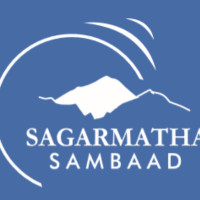- Saturday, 3 May 2025
Poets recite poems on Labour Day
BY A STAFF REPORTER,Kathmandu, May 3: Bartaman Kabita Samuha marked the International Labour Day by organising an event, 'Labour And Labourers: Special Poetry Recitation', in Mandikhatar, Kathmandu, on Thursday.
The event brought together 12 prominent contemporary Nepali poets, each presenting a poem that highlighted lives, struggles and dignity of labourers across Nepal.
The function served as the great tribute to the working class, using poetry as a medium to explore social inequality, economic hardships, and the quiet resilience of everyday workers.
Bishwa Sigdel opened the session with 'Jus Pasalmaa', which sensitively portrayed the silent endurance of a young labourer in a juice shop, shedding light on subtle forms of economic exploitation.
In his poem 'Shram Diwasmaa', poet Chandra Bahadur Lama vividly depicted the life of labourers, effectively capturing the true spirit and significance of the Labour Day.
Sanjay Suman’s 'Pasinaa' used the metaphor of sweat to express the unseen value of labour and perseverance. In 'Manis Ra Parkhaal', Rami Priya examined the psychological and societal barriers faced by the working class, drawing a powerful comparison between people and walls.
A deeply moving piece, 'Gitti Kutne AamaikoYaachanaa' by Tirtha Raj Bhatt, depicted a mother breaking stones for a living, her words echoing a plea for dignity and change.
Dil Kumari Dongol recited 'Seto Apron', a poem that reflected the struggles of working women-particularly those in caregiving and health professions - navigating labour with compassion and quiet strength.
Namaraj Ghimire’s 'Bhuinmanchhe' focused on those rooted to the margins of society- humble, often ignored, yet carrying immense strength.
With touching simplicity, Dhir Kumar Shrestha’s 'Garib Daasko Katha', narrated the story of a poor servant’s life, marked by silent suffering and unwavering loyalty.
In “Oh Bhariya Daai”, Suresh Gaule gave voice to the back-breaking burdens borne by porters, both literal and emotional.
Keshab Silwal’s 'Jutho Bhaadaa Batuldai Euti Mahila' highlighted a woman who collects used utensils, revealing layers of caste, class, and gender prejudice. Concluding the event, Avaya Shrestha presented 'Sukunarako Pavitra Mandir', a lyrical tribute to a farmer who has lost his only a piece of land under the boot of development. Similarly, Ishwor Thokar recited a poem entitled "Timro Naam".
The event also served as a poignant reminder of the dignity of labour and the human stories behind every working hand.
Bartaman Kabita Samuha’s initiative was widely appreciated for giving space to such voices and perspectives, reaffirming poetry’s role as an agent of empathy, awareness, and social justice.
Representing Bartaman Kabita Samuha, poet Bishwa Sigdel stressed the significance of poetry as the tool for generating awareness and inspiring change.
"Poets should accept that physical labour is the key to every sort of change," he announced. "We will organise similar events in the days ahead, focusing on various critical issues of the nation and the world."
Bartaman Kabita Samuha is a group of six promising poets, including Sigdel, Chandra Bahadur Lama, Rami Priya, Sanjay Suman, Dhir Kumar Shrestha and Puru Ghimire.
















